Table of Contents |
guest 2025-07-01 |
Targeted Quantitative Proteomics Course at UW
Instructor List
Course Schedule
Thanks!
During the week of March 23-27, thirty participants met with ten instructors to learn and discuss targeted proteomics and Skyline data processing in the second Targeted Quantitative Proteomics Course at the University of Washington. The feedback was overwhelmingly positive including 100% of those that participated saying they would recommend the course to colleagues. The course instructors thoroughly enjoyed the chance to engage with this enthusiastic group of proteomics researchers.
With the success of this 2nd annual course, we anticipate being able to offer it again next year and into the future at the University of Washington.
Thanks to everyone who put energy into making this a great experience for everyone involved.
Targeted Quantitative Proteomics Course at UW

Dear Skyline Users:
The Skyline Team and our collaborators are proud to announce our second Targeted Quantitative Proteomics Course at the University of Washington, which will be held in March, 2015. Like the first, the course schedule will cover a range of targeted techniques using SRM, PRM, data independent acquisition (DIA) and MS1 filtering, and topics like system suitability, immuno-SRM, plasma proteomics, statistical methods for designing and analyzing these experiments and, of course, learning to use Skyline software more effectively in your research. The instructor list includes researchers and software developers with a wealth of combined experience in targeted and quantitative proteomics, and both using and creating Skyline to meet the needs of this research approach.
Space is limited. However, all applications submitted by the deadline of November 21st will be considered equally on the merits of the application.
We hope you will join us for this exciting week.
Brendan MacLean
Skyline Project Lead
When: Monday - Friday, March 23rd - 27th, 2015
Where: Foege Building, University of Washington, Seattle (Meet at 9am Monday between Foege South and North [map])
Cost: $200 academic, $750 industry
Apply by: November 21st
Pay by: January 16th
Participants: 30
Room & Board: Not included
[registration closed]
Related Links:
Course Schedule
Instructor List
Instructor List
The following instructors and speakers have agreed to contribute their expertise to the success of the Targeted Quantitative Proteomics Course at UW:
 |
Michael J. MacCoss, Ph.D. Mike became interested in biomedical applications of mass spectrometry while working in Dr. Patrick Griffin’s protein mass spectrometry lab at Merck Research Laboratories. He obtained a Ph.D. with Professor Dwight Matthews and pursued a postdoc with Professor John R. Yates III. In 2004 he started the MacCoss lab at the University of Washington and it became obvious that while mass spectrometry data could be collected quickly and robustly, the lack of computational tools for the visualization and analysis of these data was a stumbling block. In 2009 he recruited Brendan MacLean with the goal of developing professional quality software tools for quantitative proteomics. Mike has worked closely with the Skyline development team and our outstanding group of laboratory scientists and collaborators to ensure that our software uses analytical approaches that have been thoroughly vetted by the mass spectrometry community. |
|
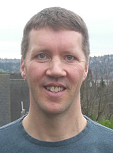 |
Brendan MacLean Brendan worked at Microsoft for 8 years in the 1990s where he was a lead developer and development manager for the Visual C++/Developer Studio Project. Since leaving Microsoft, Brendan has been the Vice President of Engineering for Westside Corporation, Director of Engineering for BEA Systems, Inc., Sr. Software Engineer at the Fred Hutchinson Cancer Research Center, and a founding partner of LakKey Software. In this last position he was one of the key programmers responsible for the Computational Proteomics Analysis System (CPAS), made significant contributions to the development of X!Tandem and the Trans Proteomic Pipeline, and created the LabKey Enterprise Pipeline. Since August, 2008 he has worked as a Sr. Software Engineer within the MacCoss lab and been responsible for all aspects of design, development and support in creating the Skyline Targeted Proteomics Environment and its growing worldwide user community. |
|
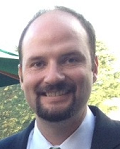 |
Michael Bereman, Ph.D. Michael is an assistant professor in the Department of Biological Sciences and a member of the Center for Human Health and the Environment (CHHE) at North Carolina State University in Raleigh, NC. The central focus of his research is to develop innovative, quantitative methodologies to investigate the interplay between environment and genetic factors with respect to human health and disease. The assessment of a vast number of environmental exposures on disease risk remains a critical – yet unfulfilled challenge. His efforts focus on the continued improvements in technology with applications in two key areas: 1) Development of assays to quantify the degree of overall exposure in biological fluids using existing and novel protein modifications; and 2) The elucidation of the impact of various environmental exposures on the etiology of diseases using both human specimens and animal models. Prior to joining NCSU, he held a post-doctoral position in the Department of Genome Sciences at the University of Washington where he focused on instrumentation development, targeted assays for determining protein metabolism, and quality control in proteomics. |
|
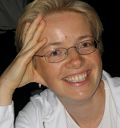 |
Olga Vitek, Ph.D. Olga is a Sy and Laurie Sternberg Associate Professor in the College of Science and the College of Computer and Information Science at Northeastern University. Olga holds a PhD in Statistics from Purdue University. She became interested in proteomics in 2005, as a post-doc in the Aebersold lab at the Institute for Systems Biology in Seattle. Between 2006-2014 Olga was Assistant Professor, and then Associate Professor and University Faculty Scholar at Purdue, with a joint appointment in Statistic and Computer Science. Olga’s research is in statistical methods and algorithms for quantitative proteomics. The methods optimize the experimental design, and ensure accurate and objective interpretation of the resulting large and complex datasets. The tools developed by her group include MSstats, an open-source software for statistical analysis of quantitative shotgun, targeted and data-independent proteomic experiments. Olga is a recipient of the NSF CAREER award. |
|
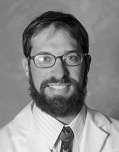 |
Andy Hoofnagle, MD, Ph.D. Andy is an Associate Professor in the Department of Laboratory Medicine at the University of Washington. His laboratory focuses on developing CLIA-certified assays for small molecules using mass spectrometry. They also investigate the function of high density lipoproteins in patients at increased risk for cardiovascular disease and the translation of proteomics technologies into the clinical laboratory. |
|
 |
Jacob D. Jaffe, Ph.D. Jake is the Assistant Director of the Proteomics Platform at the Broad Institute. He obtained his B.A. in Biochemistry from the University of Pennsylvania and his Ph.D. from Harvard University where he studied with George Church and Howard Berg. Dr. Jaffe has pioneered diverse problems in modern proteomics including large-scale mapping of proteomic data onto genomes, thus allowing their de novo annotation from proteomic evidence, pattern recognition for quantitative proteomics, determination and quantification of epigenetic marks on histone proteins, and high-throughput targeted phosphoproteomics. |
|
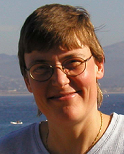 |
Birgit Schilling, Ph.D. Birgit joined the Chemistry Core and Mass Spectrometry Laboratory at the Buck Institute for Research on Aging in Novato, CA in 2000 (director: Dr. Gibson). Research projects include investigations of neurodegenerative diseases, aging, cancer, mitochondrial damage, protein posttranslational modifications including acetylation in bacteria, the role of surface glycoconjugates in bacterial pathogenesis etc., but also mass spectrometric method development. Birgit has worked in the field of protein quantitation to assess differential protein expression or changes in posttranslational modifications, particularly using selected reaction monitoring stable isotope dilution mass spectrometry (SRM-SID-MS), and other chemical and metabolic labeling quantitative workflows, i.e., iTRAQ and SILAC technologies. Birgit has participated in large multi-laboratory SRM verification studies taking advantage of Skyline’s platform independent features. In recent years, she has used more and more label free protein quantitation approaches to investigate discovery mass spectrometric data sets (Skyline MS1 Filtering), as well as newer quantitative workflows, such as high resolution data-independent acquisitions (SWATH and PRM). Birgit has co-developed some algorithms for the Skyline Tool Store and she also extensively uses the interactive data sharing features of the Panorama webserver. |
|
 |
Jarrett Egertson, Ph.D. Jarrett is a postdoctoral researcher at the University of Washington Department of Genome Sciences. He works in the MacCoss Lab and primarily focuses on developing new data acquisition methods and software in support of these methods. Jarrett earned his undergraduate degree (B.S. in Molecular, Cell, and Developmental Biology) from UCLA in 2008. While earning his undergraduate degree, Jarrett researched at the Spielberg Family Center for Applied Proteomics at the Cedars-Sinai Medical Center. |
|
 |
Jeffrey Whiteaker, Ph.D. Jeff is currently Director of Proteomics in the laboratory of Mandy Paulovich at the Fred Hutchinson Cancer Research Center in Seattle, WA. Originally from Arizona, he received a B.S. in Chemistry at the University of Arizona and obtained a PhD from the University of California at Riverside. He pursued post-doctoral research at the University of Maryland in the laboratory of Catherine Fenselau. He has been in the Pacific Northwest since 2004, where his current research focuses on using proteomic techniques to discover and validate biomarkers related to cancer. |
|
 |
Meena Choi, M.S. Meena is a PhD student in the Department of Statistics at Purdue University, in the group of Olga Vitek. Meena's research is in development of statistical methods for quantitative proteomics, and for discovery of protein biomarkers of disease. Meena is the main developer and maintainer of the open-source software package MSstats for statistical analysis of quantitative proteomic experiments. Since 2012 Meena established a collaboration with Brendan MacLean and the MacCoss lab, with the goal of making MSstats available as an external tool in Skyline. |
|
 |
Vagisha Sharma Vagisha got involved with proteomics at UC San Diego where she worked with Prof. Vineet Bafna. During that time she built her first tools for visualizing Mass Spectrometry data while working at ActivX Biosciences. Since moving to Seattle Vagisha has worked on Mass Spectrometry pipelines for the Aebersold group at the Institute for Systems Biology, and developed a data management system while at the University of Washington Proteomics Resource and the Yeast Resource Center. She joined the Skyline team in October 2011 where she has been the lead developer for the Panorama Targeted Proteomics Knowledge Base. |
|
 |
James Bollinger, Ph.D., is a postdoctoral research fellow for Michael J. MacCoss in Department of Genome Sciences at the University of Washington. Originally from Chicago, he received a B.A. in Psychology and a B.S. in Biochemistry from the University of Missouri. After several years of working as a research scientist in an academic laboratory, he returned to graduate studies. Under the tutelage of Michael H. Gelb, he obtained a Ph.D in organic chemistry from the University of Washington. In his current position, he focuses his efforts on method development for targeted proteomic assays. |
Course Schedule
Monday: Introduction to Translational Mass Spectrometry and Skyline
- Welcome and intro to Translational Mass Spectrometry (Arthur)
- Intro to Skyline (Brendan)
- Tutorial: MS1 based Differential Expression in Skyline (Erik)
- Tutorial: Processing grouped study data in Skyline (Brendan)
- Basics of mass spectrometry for targeted MS (Bereman)
Tuesday: Targeted proteomics, MRM and PRM (Parallel Reaction Monitoring)
- Intro to targeted proteomics and quantitative analysis (Mike)
- Tutorial: SRM method development and refinement (Brendan)
- Peptide Selection for Targeted Proteomics – (Will)
- PRM method development (Matt)
- Tutorial: Working with PRM data (Matt)
Wednesday: System Suitability, Standards, and Absolute Quantification
- Publishing data using Panorama (Brendan)
- System suitability and quality control in Skyline and AutoQC (Lisa)
- Standards for targeted proteomics (Chris Lecture)
- Tutorial: Signal calibration and absolute quantification (peptides and proteins) (Chris)
- Quantification of Clinical Biomarkers (Russell Grant)
Thursday: Quantification of Small Molecules Using Skyline, Ion Mobility
- Introduction to Small Molecule Capabilities in Skyline (Will)
- Tutorial: Small Molecule Method Development using Skyline (Will)
- Tutorial: Analysis of High Resolution Metabolomics Data in Skyline (Will)
- Targeted Analysis of Ion Mobility Data (Erin Baker)
- Tutorial (IMS in Skyline) – Brendan
Friday: Data Independent Analysis, PTM Localization, and Targeted Discovery
- Introduction data independent acquisition (DIA) – Matt?
- Tutorial: Analysis of DIA data in Skyline (Matt? Brendan?)
- PTM Localization in Skyline (Erik)
- The Advent of “Targeted Discovery” using Large Targeted Panels (Erik Lecture)
- Feedback and Close of Meeting